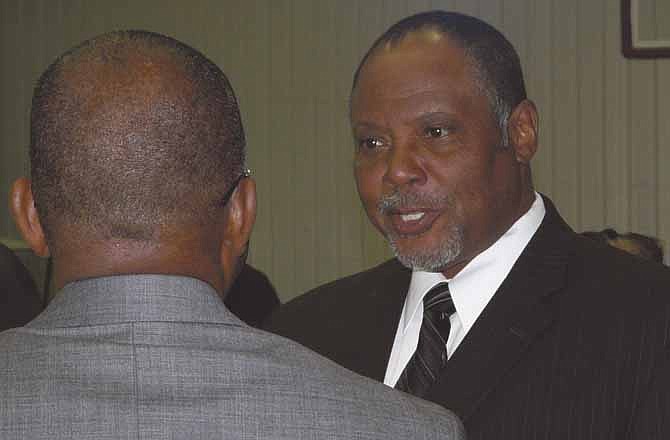Disheartened by a 1908 race riot in Springfield, Ill. - Abraham Lincoln's final resting place - a group of 60 people marked the 100th anniversary of Lincoln's birth by founding the National Association for the Advancement of Colored People, in New York City on Feb. 12, 1909.
Only seven of those founders were African-American, the Rev. Charles Jackson reminded more than 40 people attending Saturday's Jefferson City NAACP Branch Prayer Breakfast and Founder's Day program.
"They were appalled at what was going on, with the lynchings and the way that the minority people were being treated in this country," Jackson said at the beginning of his half-hour address. "The NAACP's stated goal was to secure the rights guaranteed in the (U.S. Constitution's) 13th, 14th and 15th Amendments," which, Jackson reminded the breakfast audience, "promised the end to slavery, the equal protection of the law and the universal, adult male" right to vote.
Later in the program, Rod Chapel Jr., the local branch president, urged people to sign a petition to Congress, to block those who would "eviscerate the birthright citizenship clause in the 14th Amendment."
Added to the Constitution in 1868, part of the amendment says: "All persons born or naturalized in the United States, and subject to the jurisdiction thereof, are citizens of the United States. ..."
Jackson noted that, although the NAACP's focus was, and still is, "to ensure the political, educational and social economic equality of minority groups of citizens in the United States, and to eliminate racial prejudice, 104 years later we're still fighting some of the same fights."
Jackson, who just turned 61, helped found the Guiding Light Missionary Baptist Church in Fulton, in 1996, and still serves as its pastor.
He also is a retired state employee, with more than 25 years at the Missouri Highway Patrol and another four years as Gov. Bob Holden's Public Safety director from 2001-05.
Jackson doesn't deny that advancements have been made in recent decades.
"But, overall, we're digressing back to some of the things I saw back in 1983, when I took over as the affirmative action officer at the Highway Patrol," he said.
With Barack Obama's election as America's first black president, Jackson noted, more and more people are saying, "There's no use to advertise jobs outside our agency or company. Everything is equal now."
More and more, he said, employers are reverting to recruiting "from within," a process that drastically reduces the opportunity for minorities even to get a chance to begin a career.
Over the years, Jackson recalled, the Jefferson City NAACP Branch "has been very instrumental in (employment) progress in state government," especially when Dr. William Ross, the long-time branch president who died in 2007, would demand that state agencies like the patrol - or private companies, like the News Tribune - recruit and hire more minorities as employees.
"We have to use that network that's already available to address some of these (continuing employment and discrimination) issues," Jackson said.
"We need to be involved in the political process" because today's politicians "are putting roadblocks and things like that up" in the way of progress.
Political office should be "a servant's position," he said.
Last year, Jackson ran as an independent, write-in candidate for lieutenant governor. (He got 346 votes out of nearly 2.68 million cast, or .0129 percent of the total statewide vote).
"I learned a lot by getting out and visiting people around the state," he said. "And communication is one of our key ingredients that's missing.
"People are not talking about what's going on."
He said voters are not holding candidates accountable, noting that many people today "are more interested in the title of a position than doing the work of a position."
"We're not saying, "What do you believe in?' before we elect them to office," Jackson said. "The NAACP has a mechanism in place to address these issues - it's just that we don't have people with that focus."
He added: "And it's time that we get some leadership back in the NAACP," at the local, state and national levels. "We need to require - and start putting some pressure - that, if you're going to be in a leadership position, you need to fulfill those responsibilities."
Jackson challenged his audience to double the Jefferson City chapter's membership (to about 1,200), and "to make a change in the next year" in activities and leadership.
Web link: http://www.naacpjc.org/

